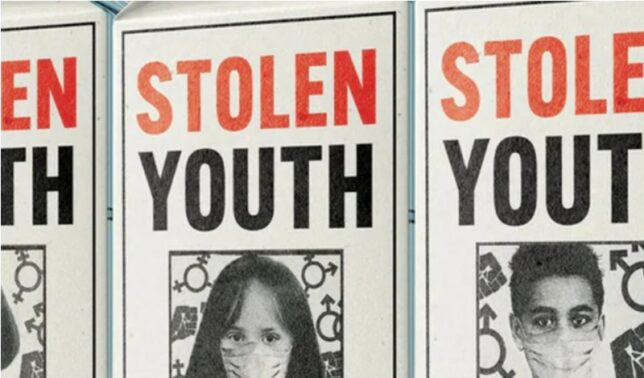Book Profile
Stolen Youth and the “Power of the Powerless”


The manager of a fruit-and-vegetable shop places in his window, among the onions and carrots, the slogan: “Workers of the world, unite!” Why does he do it? … I think it can safely be assumed that the overwhelming majority of shopkeepers never think about the slogans they put in their windows, nor do they use them to express their real opinions.
—Vaclav Havel, anti-communist dissident and first President of the Czech Republic
In their book Stolen Youth: How Radicals are Erasing Innocence and Indoctrinating a Generation, Bethany Mandel (a stay-at-home mother, children’s book editor, and political commentator) and New York Post columnist Karol Markowicz detail the alarming shifts toward ideological indoctrination in education and medicine with their own personal stories. They present testimonies from parents, doctors, and others and extensive recapitulation of press reports. Readers of the Capital Research Center or InfluenceWatch will find none of their findings particularly unexpected; capture of institutions ranging from school boards to the American Academy of Pediatrics by left-of-center interests is one of CRC’s focus areas.
But the extent to which they have succeeded, as Mandel and Markowicz detail, is alarming. Chapter 7, titled “Sexualized Childhood,” leaves a particular disgusted feeling in the stomach with its examination of the radical left’s efforts to destigmatize sexual attraction to minors and to encourage sexual behavior by minors.
Havel’s Greengrocer
Among the useful contributions Mandel and Markowicz provide are testimonials from (often anonymous or semi-anonymized) ordinary liberals and moderates who are alarmed by what “woke” activism is inflicting on children. In discussions of “woke medicine” and America’s increasingly uniquely aggressive approach toward gender transitions in minors, the authors interview a pseudonymous physician from the very liberal and Democratic-leaning Washington, DC, metropolitan area who would not even discuss her concerns in writing.
The problem is that these people feel compelled to remain anonymous. At a step’s remove from these people are those who, like the greengrocer in Czech dissident Vaclav Havel’s essay “The Power of the Powerless,” go along with the slogans the dominant culture proclaims, either without thought or despite privately opposing what the slogans really mean. While America may not have a Stasi or StB (the Czechoslovak Communist secret police that persecuted Havel and his allies), the chilling fear of cancel culture yields an “Our Democracy” that bears an uncomfortable resemblance to Havel’s “post-totalitarianism.”
Preference Falsification
One suspects that the average liberal American holds in the secrecy of their own hearts and minds a position closer to that of author J.K. Rowling than to the activists who assert that babies or toddlers can know that they are “in the wrong body.” (Rowling has faced a full-blown cancellation campaign for asserting that male-to-female transgender people and natal women are different.) Yet few, perhaps seeing the campaign waged against Rowling and not possessing Rowling’s fully operational reserve of eff-you money, dare to publicly express their position, even within the liberal movement or Democratic Party.
In his essay, Havel details the many ways Communist-ruled Czechoslovakia discouraged and repressed political expression. The chilling effect and fear did most of the work. The absence of free and fair elections also contributed—what is the point of dissenting from the regime if the regime cannot be changed?
But America has free elections, certainly nothing remotely resembling the farcical “elections” of the Eastern Bloc. In most circumstances, even in one-party jurisdictions party primaries are free and open (even if only to those who register with the dominant party). So liberals who oppose the radicals have more theoretical ability to change the regime than did Havel’s greengrocers, but they are unwilling or unable to vote against the activist wing. And they are unable to direct the Democratic Party and liberal movement to cease pressing the activists’ radical vision.
Instead, they falsify their preferences, aligning with the party line.
Effecting Glasnost and Perestroika
Mandel and Markowicz offer advice for their readers on how to protect children from the influence of woke politics. Mandel, a public advocate for homeschooling, details how she went about doing it, and Markowicz, who moved from New York City to Florida in response to the COVID-19 pandemic lockdown policies in both jurisdictions, details how to work within the system.
But I have other questions. Not all families can follow either Mandel’s model of withdrawal or Markowicz’s model of voting with her feet. Either approach could be crushed by a sufficiently empowered national majority, which the Biden administration has given every indication it would do if it could. As a man once said, “Wars are not won by evacuations.”
But what if there isn’t a real national majority—or even a real regional majority in certain quite-blue areas—for the worst abuses of the woke movement? What if, like Havel’s greengrocers, the default liberals of those areas aren’t expressing their sincerely extreme views but rather swimming with a current they do not notice or would swim against if they had the strength? That would change things.
In Havel’s case, the Czechoslovak Communist state was built on a foundation of sand. Once Soviet glasnost and perestroika opened discussion of the poor state of the Communist world and Soviet leaders indicated they would not roll tanks to crush dissent as they had in 1968, the regime was doomed. If I am correct in assessing that the woke regime Mandel and Markowicz detail is also built on a foundation of sand, then the question arises: How does one facilitate the openness and restructuring that will bring it down? How does one make it “safe” to dissent, especially in difficult regions?
In Stolen Youth, Mandel and Markowicz have provided a useful service in compiling in one place the current state of the woke-left campaign to radicalize young children. It will fall to others to devise the strategic approaches to make it so that disputing the campaign does not require the strength of a dissident.



